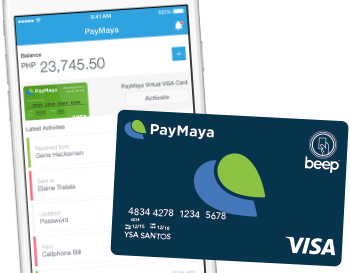Mobile money system taps interoperability to boost e-commerce

PLDT and Smart Communications’ PayMaya is a mobile money system that allows anyone to shop online even without a credit card.
The past few years have seen significant changes in the e-commerce landscape in the Philippines. Filipinos are slowly—and carefully—adopting online, but not necessarily cashless, shopping. Some online merchants still offer cash on delivery in addition to credit card and other forms of payment.
In September last year, the digital financial services arm of telecommunications firms PLDT and Smart Communications Inc. (Smart) relaunched Smart eMoney Inc. as PayMaya, a free app that allows anyone to shop online even without a credit card. It is powered by Visa and regulated by the Bangko Sentral ng Pilipinas (BSP) to ensure all user transactions are secure.
After six months, PayMaya announced a successful “trial of mobile money interoperability” with its rival telco’s own micro-payment system: Globe GCash. The official launch of the service will be announced in the next few weeks.
Interoperability
Interoperability is the ability of a system or a product to work with other systems or products without special effort on the part of the customer.
According to PayMaya’s statement, with interoperability in place, users of PayMaya in the country can soon send funds to users of other mobile money systems, including the likes of GCash and vice-versa. This move is seen to boost the growth of mobile money usage in the country and in turn expand the local digital commerce ecosystem.
PayMaya cardholders can send as low as P5 to GCash using the app. However, the recipient should first be whitelisted or verified to use GCash. Both the sender and the recipient shall receive notifications of the transaction. There is a charge of a minimal percentage of the amount sent charged to the sender.
Like ordinary banking transactions, PayMaya cardholders can only withdraw up to P50,000 a day as prescribed by the BSP.
Other services
Going beyond online shopping and digital payments, PayMaya when it was still called Smart Money introduced a domestic remittance service called Smart Padala.
Stated in PayMaya’s release are the efforts made by mobile money operators from the Philippines and key officials from Grupe Spécial Mobile Association (GSMA) who gathered at this year’s Mobile World Congress held in Barcelona, Spain, “to step up plans of integrating mobile money systems in the country within the year.”
GSMA is a group that represents the interests of mobile operators worldwide, uniting nearly 800 operators with more than 250 companies in the broader mobile ecosystem.
Interoperability with other mobile money operators is just the latest in the intensified drive for financial inclusion in the country as led by PayMaya and Voyager Innovations, the digital innovations arm of PLDT and Smart.
Aside from offering a safe and easy way to pay online through the PayMaya app and cards, Voyager has also launched financial technology innovations for the growing digital consumers of today. These include the likes of Mobile Loan Saver in partnership with Landbank, which allows government employees to take out salary loans via SMS; and Lendr, a fully digital, multi-channel, telco- and bank-agnostic platform that financial institutions and credit providers can use to reach consumers planning to avail themselves of loans through a single online marketplace.
PayMaya is said to be the No. 1 financial payments app in Google Play. People can also use it as a source of fund for PayPal, another payment service accepted worldwide; to get music from iTunes, subscribe to streaming platform Spotify, and purchase games and other upgrades. RC